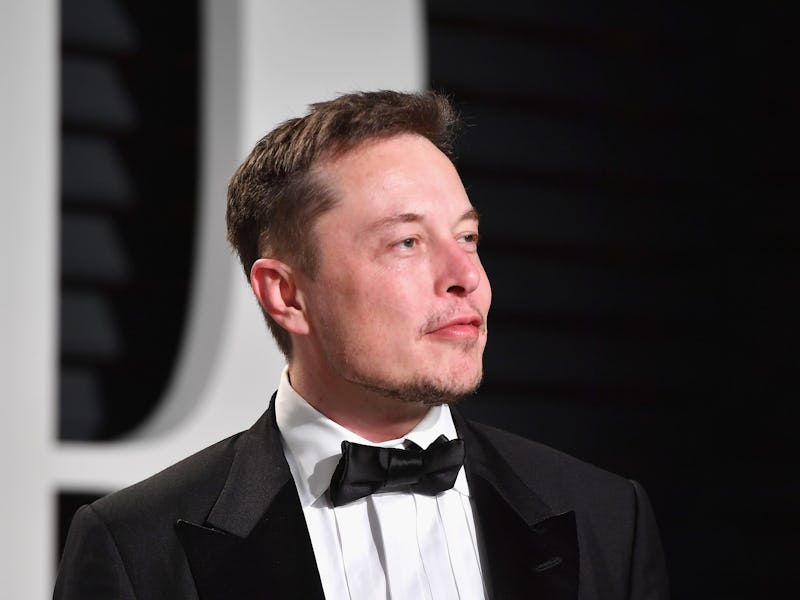Things Got Kinda Weird in Elon Musk's 'Rolling Stone' Interview
There are some gems in here.

Elon Musk made the cover of Rolling Stone (a dream come true!) and things got kinda weird in the accompanying profile.
Nestled between monologues and descriptions of Musk’s visionary and engineering abilities were snippets of his stubbornness, childhood trauma and his dating life following his breakup with Amber Heard.
According to the interview, journalist Neil Strauss not only unveiled what goes on inside the Tesla CEO’s mind, but also his broken heart.
Musk on Tesla’s early haters
Musk says during the electric automaker’s early days he was “literally told this is impossible and I’m a huge liar,” Musk says. “But I have a car and you can drive it. This is not like a frigging unicorn. It’s real. Go for a drive. It’s amazing. How can you be in denial?”
Despite the naysayers, Musk credits his stubbornness for the eventual success of Tesla. So even though logic pointed to the near-impossible task of producing a Model 3, what matters is he did it. “It’s very unscientific,” Musk says. “There’s this thing called physics, which is this scientific method that’s really quite effective for figuring out the truth.”
His most Jobs-esque quote:
Throughout the profile, it’s revealed that Tesla is working on a truck (delivery drivers rejoice!), complete with a “driver-comfort feature.” But according to Musk, what’s the point of overhauling cargo trucks if they’re not comfy and pretty? “Probably no one will buy it because of this,” he tells his team. “But if you’re going to make a product, make it beautiful. Even if it doesn’t affect sales, I want it to be beautiful.”
Meanwhile, elsewhere in the profile, Musk said he’d rip off a black turtleneck before ever dying in it.
Musk seems to constantly be on the verge of tears
“The tears run silently down his face,” Strauss writes.
“I can’t remember the last time I cried.” This is when Musk turns to his “chief of Staff Sam Teller, who confirm this power. “You’ve never seen me cry.” “No,” Teller says. “I’ve never seen you cry.”
On his envious yet simple ~vision~
Turns out, Musk’s only design goal is to make things “better” than others. When Strauss asked him to define “better,” this is what he came back with:
“It would be better if we mitigated the effects of global warming and had cleaner air in our cities and weren’t drilling for vast amounts of coal, oil and gas in parts of the world that are problematic and will run out anyway.”
“And if we were a multiplanetary species, that would reduce the possibility of some single event, man-made or natural, taking out civilization as we know it, as it did the dinosaurs. There have been five mass-extinction events in the fossil record. People have no comprehension of these things. Unless you’re a cockroach or a mushroom – or a sponge – you’re fucked.” He laughs sharply. “It’s insurance of life as we know it, and it makes the future far more inspiring if we are out there among the stars and you could move to another planet if you wanted to.”
This entire Boring-SpaceX-Hyperloop monologue:
On the west side of the street, a 156-foot-tall rocket towers above SpaceX headquarters, symbolizing Musk’s dream of relatively low-cost interplanetary travel. This particular rocket booster was the first in human history to be launched into space, then recovered intact on Earth after separating, and then fired back into space. On the east side of the street, an employee parking lot has been dug up and turned into the first-ever tunnel for the Boring Company, Musk’s underground-honeycomb solution to traffic jams and the future home of all his terrestrial transportation projects. Then, running for a mile beside Jack Northrop Boulevard, there’s a white vacuum tube along the shoulder of the road. This is the test track for the Hyperloop, Musk’s high-speed form of city-to-city travel. Taken together, the dreams of Musk city promise to connect the planet and the solar system in ways that will fundamentally change humanity’s relationship to two of the most important facets of its reality: distance and time.
On his notoriously unrealistic deadlines.
Any Musk critic will tell you the while the industrial titan has many good ideas, he’s not exactly known for executing them on time. This Rolling Stone anecdote seems like an effort to change that reputation.
One day Musk asked SpaceX employees how long it would take to get their cars out of the parking lot and start digging the first hole for the Boring Company tunnel. “The answer: two weeks.”
Musk didn’t buy the logistical obstacles. “Let’s get started today and see what’s the biggest hole we can dig between now and Sunday afternoon, running 24 hours a day.” Within three hours, the cars were gone and there was a hole in the ground.
Is the Tesla roof worth the cost? Check out this video to find out.